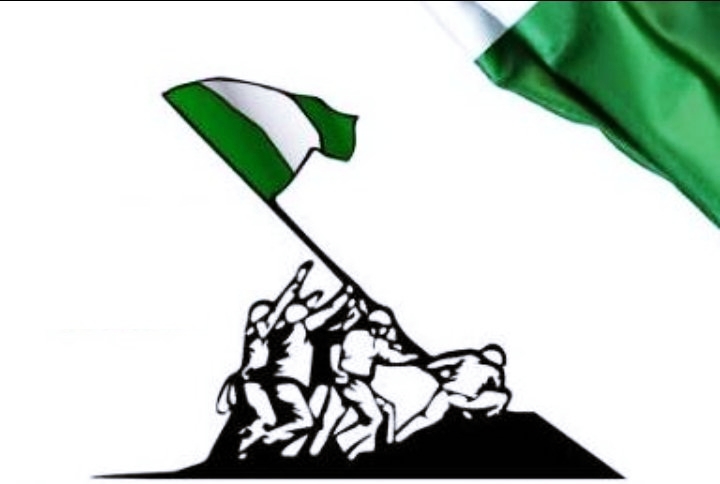The Arena
NIGERIA @59: BAD LEADERSHIP AND POOR FOLLOWERSHIP
By Abba Dukawa
‘The Nigerian problem is the unwillingness or inability of its leaders to rise to the responsibility and to the challenge of personal example which are the hallmarks of true leadership.’ late Prof. Chinua Achebe.
The country at 59 still battling with poor leadership, nepotism, corruption, mismanagement of resources, insecurity of life and property, lack of basic infrastructure and social amenities with a poverty level of 75% Nigeria Poverty is rising in Nigeria with more than a 150 million people living on less than $1a day. While Nigeria contemporary’s countries that gotten statehood are now developing countries in spite of its enormous wealth, Nigeria is among underdeveloped countries with a life expectancy of 48.8%.
Interestingly at 59 independence problem with Nigeria has been identified by most analysts and social commentators as the absence of true leadership. This I believe is just one aspect of the truth or reality. The reality of the matter is simple, Poor leadership in the context of bad followership throughout the ages in every society that has evolved successfully, social reform and change is initiated by followership and not necessarily the leadership.
I intend to depict the generally accepted position that the problem with Nigeria is squarely the problem of leadership but I argue that Nigeria, like any other country, is peopled by stakeholders who are both leaders and followers. It then behooves on every Nigerian to rise to the occasion of saving and securing Nigeria. Every Nigerian is a major stakeholder and therefore owes it a duty to salvage Nigeria from the quagmire of poor leadership. The success or otherwise of leadership will not be in isolation of followership. Both leaders and followers are guilty in the event of failure of the state. The support given to leaders in Nigeria, always allowing them to have their way in almost everything is the guilt of the citizenry.
At 59th independence yet we cannot always hold our leaders accountable. Are the leaders in Nigeria coming from Mars? Even at the most basic levels, do we demonstrate and model good followership by demanding good governance. In the electoral process, do we ensure that individuals that rightly won elections are supported through mass support in their redress process? Do we participate in the legislative process or do the followers have regard for the laws, norms customs and traditions? If we say that we belong to a political party from where leaders emerge we should be able to influence the leadership. It is only in Nigeria that the followership supports a candidate for reasons other than the political ideology.
At 59th independence, Nigerians fully well swallowed the pills administered to them by their leaders even when such pills are bitter. The leaders have perfected their manipulatory skills such that even civil society groups, professional bodies, and religious organizations have fallen to the spell of poor leadership as if they are no more rational beings so to speaks the guilt weighs more on the followership, who have allowed them to be manipulated, deceived, abused, used and dumped by the leaders who should be there to protect their interest.
At 59th independence, we can either celebrate or soberly reflect on major problems bedeviling us as a people and nation like corruption. Nigerians are a living witness that in any address made by all serving and ex-presidents, they claimed to fight against corruption. “We are committed to transparency and accountability.” But despite these promises from the leaders, still, corruption has eaten deeply in the country.
To understand how this cancer has eaten deeply in our society, honouring transparency and accountability is no longer fashionable, and corrupt people don’t feel bad about their actions, because everybody else is doing it anyway. Those who choose not to do it are considered cowards and becoming a laughing stock in the society. The surge of kidnappings and killings by bandits, coupled with the resurgence of a Boko Haram affiliated to the Islamic State group are our greatest headaches.
For more than two and half decades, Nigeria never had such serious economy challenges like what we are now largely due to dependent on oil as government revenues, fluctuating prices leave the Nigeria vulnerable. The World Bank has predicted sluggish growth this year coupled with unemployment at more than 20% and nearly half the population living in extreme poverty. Infrastructure deficit: despite the billions of naira being pumped into numerous building projects by 2040, Nigeria’s infrastructure deficit will hit $878bn making it hard for businesses to prosper.
At 59th independence, more than 150 million Nigerians are languishing in poverty in the country. Nigerians have been disappointed to the greater level with the development shape our country in almost six decades where every sectors is decaying due to the lack of political will of our leaders and proactive citizenry role. Our failures to make concerted effort by insisting that the right thing must be done and we citizen must rise up and unite against misgovernment, corruption and nepotism if we really want to see the country move forward. We have to be courageous to imbibe the culture of prudence, honesty and accountability.
We must ensure people with proven honesty and accountability are elected and the citizenry to adopt effective citizens role while those within the corridor of power must have courage to tell the leaders truth and not to be glorify praise singers.
Nothing will change unless the leaders and led have this country at heart.
Dukawa can be reach at abbahydukawa@gmail.com





























